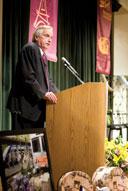France, United States histories ‘intertwined’

Dr. Michael Mosher, chair of the political science department at the University of Tulsa, lectures on the relationship between the United States and France during the Gockel Symposium Oct. 24 in Webster Hall auditorium.
Comparisons of the United States and France topped the discussions at the Gockel International Symposium Oct. 20 in Webster Hall auditorium.
During the evening lecture, Dr. Michael Mosher, chair of the political science department at the University of Tulsa, presented “Le Divorce ou la Conciliation?: France and America in a Screwball Comedy of Remarriage,” comparing the relationship between France and the United States to two films.
Mosher said It Happened One Night and The Awful Truth can refer to the remarriage of the two countries. He said it is not about France’s differences with the Americans; it is about the similarities.
“The history of the United States and France are intertwined,” he said. “Our histories are of shared value, shared sacrifice (and) shared success so to will be shared future.”
Nadeau also presented “Why France Remains Influential” during the evening lecture of the Gockel Symposium. He said the French are old natives.
“They are an old people that have evolved over time,” he said.
Nadeau said France is modern and no historian agrees when the modern France began.
“They have organized themselves according to their own problems,” he said.
Nadeau said the French are the “Americans of Europe.”
“The French don’t mind speaking for others,” he said.
In comparing the United States and France, Nadeau said he used a metaphor.
“(France is) a mouse with the skin of an elephant,” he said. “(The United States is) an elephant with the skin of a mouse.”
During the lecture, Nadeau said there are reasons France still remains influential: geographical, economical, philosophical and psychological.
“France is more democratic (and) richer,” he said. “It does maintain an open policy of power.”
For geography, Nadeau said like Alaska and Hawaii are part of the United States, France has territories such as French Guiana, Guadeloupe, Réunion and Martinique.
“Theses are integral parts of France,” he said.
For economical, Nadeau said France’s economy is efficient and the country is there and aware of it.
“(It is) very involved in globalization,” he said.
Nadeau said in the area of anti-Americanism, some French hate American policy.
“Lots of French aren’t anti-American,” he said.
Nadeau said the French and the Americans do not have human values in common, but they have similarities.
“Both societies are democratic,” he said. “Both want to make sure that regional conflict does not interfere.”
However, Nadeau said the United States and France do not always have the same views.
“(They don’t agree on) democracy and economics,” he said.
Nadeau said there are some aspects of Americanism the French like and don’t like.
“Some are bothered by McDonalds, but they do go to McDonalds,” he said.
Considered young, Nadeau said some people would say the idea of traditional France is a dangerous idea.
“Nobody ate baguette in France 150 years ago,” he said. “Nobody walks around France in berets. The French take whatever suits them.”
Nadeau said during the morning lecture he thought the students were silent.
“I was not certain that the speech had worked, but the professors reassured me by saying that nobody walked out,” he said.
Nadeau said he found the questions the audience asked were interesting.
“It does show that there is some acquaintance with the country,” he said. “It’s quite obvious. Some people have traveled there and know it well.”
As for the international studies program, Nadeau said he is impressed with how it is done.
“It’s not something you would expect,” he said.
Nadeau also presented “The République Fractured: How the French Deal with Global Influence” in the morning session in Taylor Auditorium, where he discussed the protests in France, globalization, immigration and assimilation into society.
Your donation will support the student journalists of Missouri Southern State University. Your contribution will allow us to purchase equipment and cover our annual website hosting costs.



























